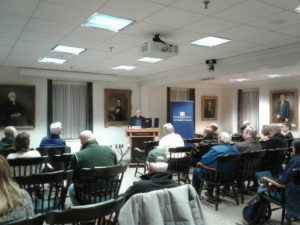Nichols Delivers Scharf Lecture

Dr. David Nichols delivers the Henry M. Scharf Lecture in the Penn Hall Lyceum on October 24, 2018 (Photo Benjamin Pontz/The Gettysburgian)
By Benjamin Pontz, Editor-in-Chief
Historian David Nichols delivered the Henry M. Scharf Lecture Wednesday evening in the Penn Hall Lyceum to an audience of about 35, many of whom were community members associated with the Eisenhower Society.
Nichols, whose body of work on President Dwight D. Eisenhower has been credited with the 34th president’s recent ascent from the middle of the pack to the upper echelon in historians’ rankings of presidents, discussed his 2017 book Ike and McCarthy: Dwight Eisenhower’s Secret Campaign against Joseph McCarthy.
Gettysburg College Professor of History Michael Birkner introduced Nichols and called his three books on Eisenhower, each of which he wrote in his retirement after 25 years as a professor and administrator at Southwestern College, the most valuable works for understanding the president who lived the final years of his life in Gettysburg and in whose honor the Eisenhower Institute, which hosted the lecture, was named.
Nichols prefaced the lecture by quipping, “The book is a whole lot better than the speech. Buy the book,” and suggested that he gets too much credit for the higher regard in which contemporary historians hold Eisenhower.
“My profession didn’t do its job for a long time,” he said, referring to historical analysis that focuses predominantly on public statements rather than the trove of primary source material — including contemporaneous diaries kept by many of his lieutenants such as Press Secretary James Hagerty — on which his work draws.
Turning to the subject of the lecture, Nichols stated that one of the primary criticisms of Eisenhower — that he failed to face down Joseph McCarthy — overlooks what he called Eisenhower’s work “to destroy the senator behind the scenes.”
Because he believed that public repudiation or engagement with McCarthy would embolden the Wisconsin Senator, Eisenhower refused to get “into the gutter” through direct engagement, but, beginning in the first year of his presidency, he began to make veiled references in public and engage members of his staff in a covert campaign to discredit McCarthy, Nichols said.
As McCarthy’s hearings while leading the Senate’s Permanent Subcommittee on Investigations grew closer to Eisenhower’s inner circle, the president grew more agitated and ordered his administration to prepare a report to expose McCarthy. Eisenhower’s allies in the Senate as well as prominent figures in the media began to publicly decry McCarthy’s activities, statements of which Eisenhower approved wholeheartedly, Nichols asserted.
Nichols quoted a 1954 broadcast of “See It Now,” a CBS program, which anchor Edward R. Murrow closed by entreating viewers: “We will not walk in fear, one of another.”
Nichols offered that the quote might also be applicable in America’s present circumstances. On several occasions during the lecture, Nichols did not hesitate to link President Donald Trump’s conduct to that of McCarthy, noting on one occasion that the two are connected via Roy Cohn, a New York attorney who was Chief Counsel for McCarthy’s subcommittee and went on to be one of Trump’s foremost mentors in the latter 20th century.
McCarthyism, Nichols said, is a recurring feature in the American political lexicon, but one that Eisenhower demonstrated can be overcome.
He closed the address by reading from Eisenhower’s final statement to the press, a piece in Reader’s Digest published shortly after his death.
“I did what I could behind the scenes to help people who were damaged by McCarthy,” Eisenhower wrote in the article, which was about political extremism.
With that, Nichols said, Eisenhower had — at long last — publicly confronted McCarthy.
Nichols’ book is available in Musselman Library.
